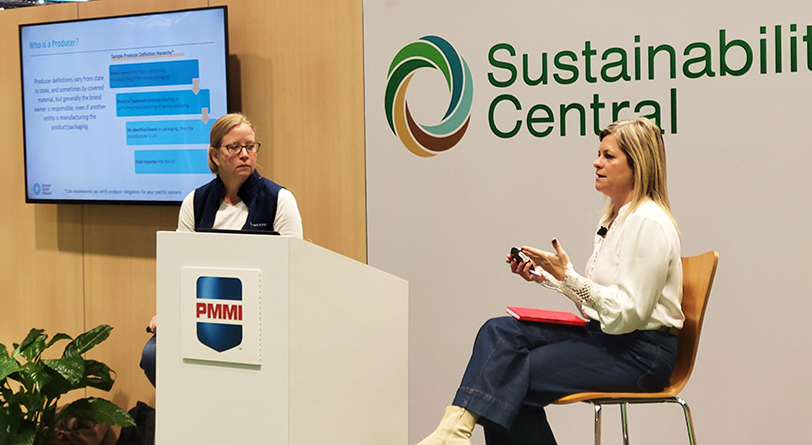As a Nonprofit, Producer Responsibility Organizations Remain Neutral, Expert Says
Several States Have Chosen the Circular Action Alliance to Oversee EPR Programs

An audience member during a presentation about producer responsibility organizations (PROs) at the recent PACK EXPO International expressed skepticism about whether a PRO can fairly implement extended producer responsibility (EPR) laws that will ensure the strongest sustainability measures.
“EPR enjoys broad support in the sustainable packaging world,” the audience member told the presenter. “However, PROs appear to be a group of industry leaders coming together to regulate the industries that they are in—and that could lead to a watering down of the EPR regulations.”
Olivia Barker, communications adviser at the Circular Action Alliance (CAA), responded by pointing out that CAA is a nonprofit, 501(c)(3) organization, not an advocacy organization. CAA has been picked to oversee EPR programs in several states as their PRO, including two of the five that have passed EPR regulations so far.
“We are a compliance organization,” Barker said. “Our job—and our mission—is to implement these laws effectively.”
Strong Oversight
The way EPR programs work is that the producers of packaging waste such as consumer packaged goods companies are assessed fees that will finance systems to handle waste. The goal is to divert as much waste as possible from landfills by making it recyclable, reusable, or compostable. The job of the PRO is to oversee the operations and work with regulators on a state level to ensure systems operate efficiently while setting up fair fee structures the producers pay into.
“We are bound to specific and robust performance requirements and targets within these laws,” Barker said. “We also have to communicate and share information with the state extremely transparently.”
For example, all of the fees producers must pay will be openly listed.
“Everything that we pull together to make a program work has to be overseen by and approved by the state,” Barker added. “The states also often have advisory boards or advisory councils that have varying levels of responsibility and that have representation across that EPR stakeholder landscape.”
Those stakeholders include large and small producers, local governments, and nongovernmental organizations.
“There are a lot of eyes on this,” she also said, adding that a 501(c)(3) has additional layers of reporting on top of the laws. “We have to be open about what we’re doing, and there are not opportunities for us to water down the target.”
More Information
Barker’s presentation was one of several she gave during the four-day PACK EXPO International in November 2024 in Chicago. EPR has been gaining increasing attention as more states move to adopt programs. So far, California, Colorado, Maine, Oregon, and Minnesota have passed EPR laws. As of December 2024, CAA had been picked as the PRO in California and Colorado and was in play to be the PRO in Oregon. It has also been selected to be on an advisory panel in Maryland, which is one of the states that continues to debate EPR legislation.
In her presentations at PACK EXPO, Barker pointed out that companies must register with a PRO if they are covered under the laws. Some of the deadlines to do so have passed, with October 1, 2024, being the date for registering in Colorado. Producers who missed the deadline still need to register, and there is no cost for registration.
More details, including how a company can determine if they are a covered producer, can be found on CAA’s website. The states offer some exceptions, although they are different in the various states, and include ones for small producers, according to the website. “Please consult with your legal counsel if you are unsure whether your company will be exempt or not,” according to the CAA site. (A helpful FAQ can be found on the site).
The website also offers further details and explanatory webinars about EPR and what companies should expect.
On January 22, 2025, CAA will hold a new hourlong webinar in a series about Oregon’s Plastic Pollution and Recycling Modernization Act titled “Oregon Program Plan: Funding Agreements” that starts at 1 p.m. (EST).
Editor’s note: In the image featured with this article, Olivia Barker, communications adviser at Circular Action Alliance, gives an overview about producer responsibility organizations during a presentation at PACK EXPO International in November in Chicago. Left is the moderator of the presentation, Kyla Fisher, who was representing AMERIPEN—the American Institute for Packaging and the Environment. (Photo by Thomas A. Barstow)
Thomas A. Barstow is senior editor of FlexPack VOICE®.


